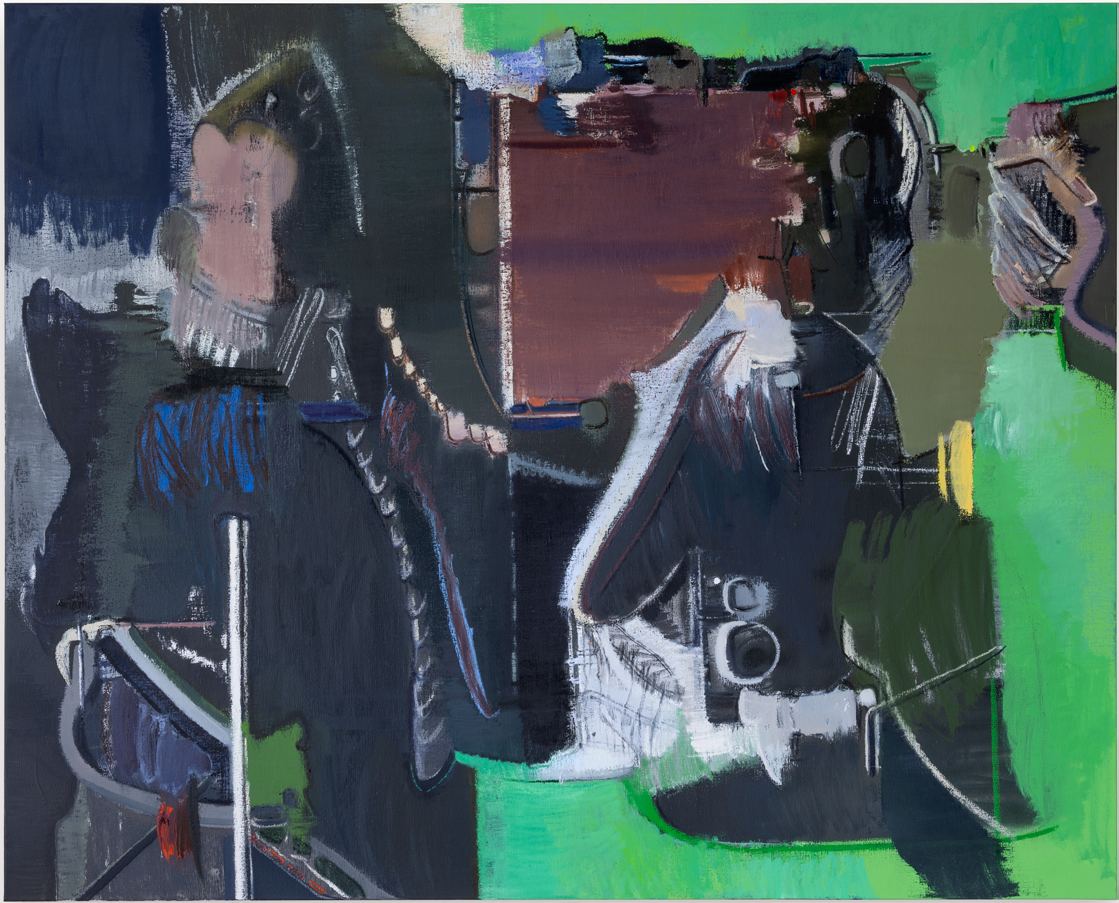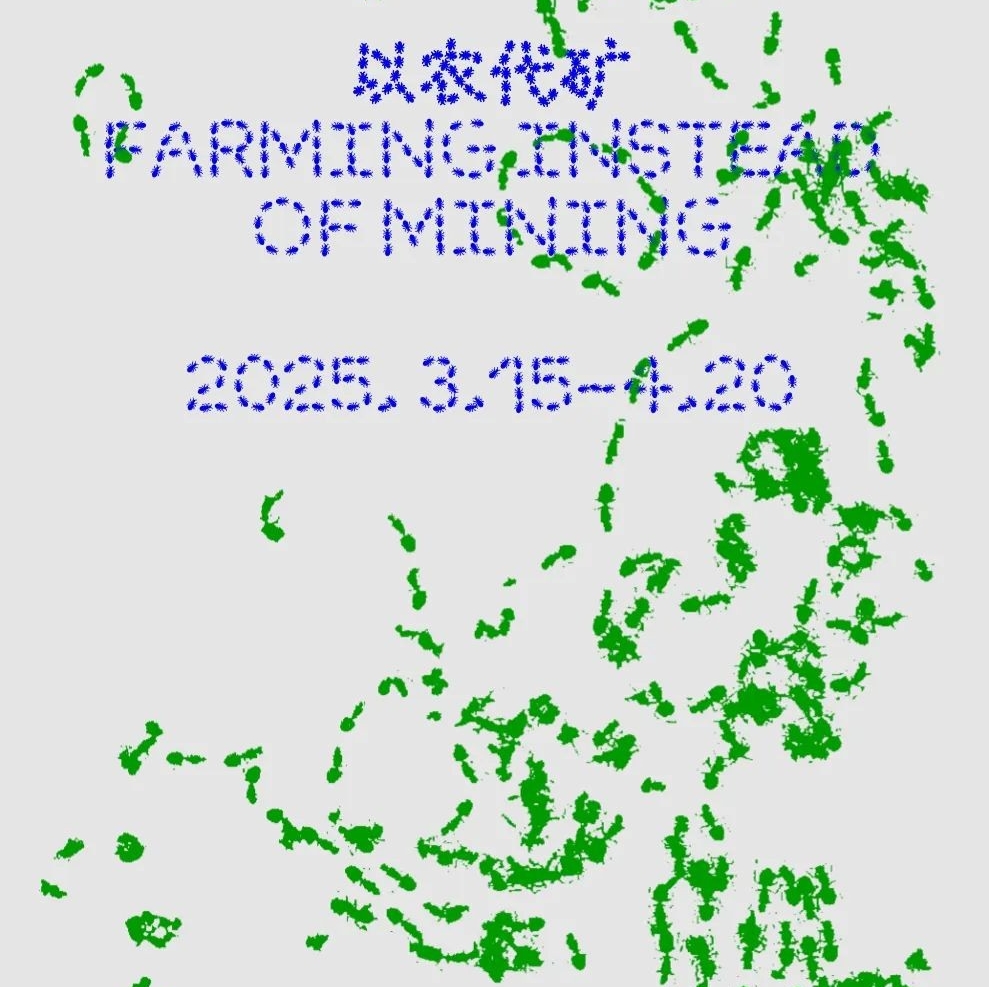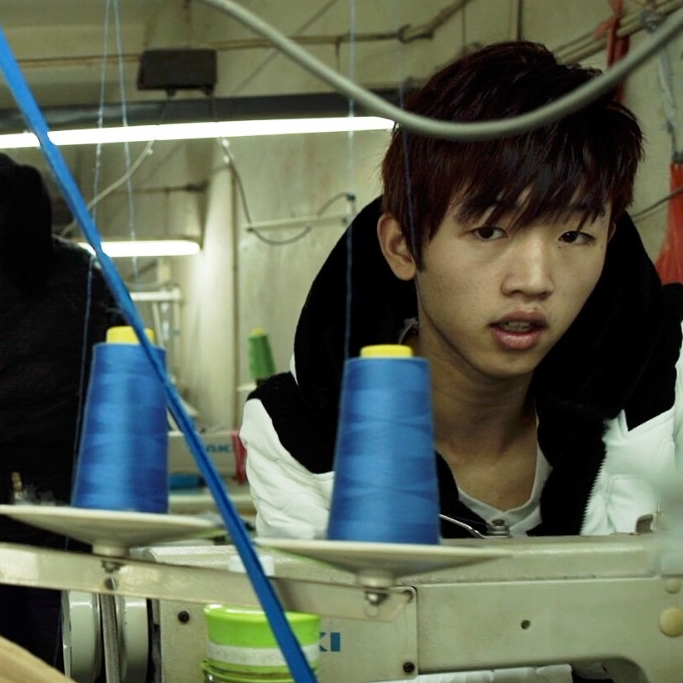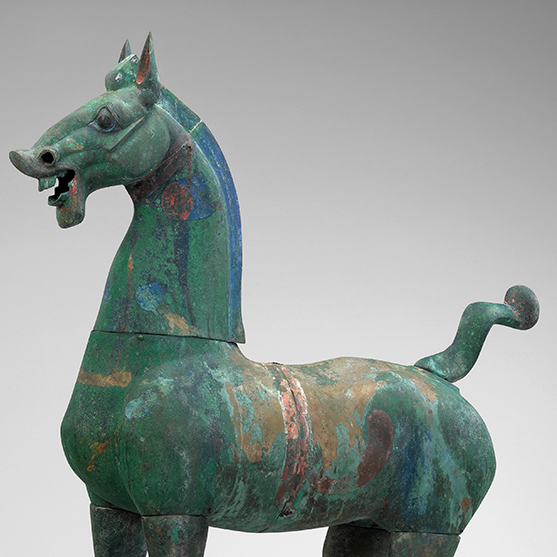
'I take something that is meant to be ignored or quickly forgotten and turn it into something that makes me wonder and linger. That is my way of combating the feeling of being overwhelmed by all the information that is thrown at us on a daily basis.'—Han Bing
In her first solo exhibition at Thaddaeus Ropac, the Chinese-born, Paris-based artist Han Bing is presenting a group of new, large-scale paintings alongside more intimate and instinctive works on paper. A Very Lucky Man’s Melancholy, Between her and her god, Paul’s dream, the intriguing titles Han gives her paintings echo their layered imagery – an aggregate of experiences and encounters that the painter channels onto her canvas. Her fragmented compositions reminiscent of torn posters are contrasted with bold swathes of electric colours, opening up new pictorial dimensions somewhere between the familiar urban reality and poetic, imaginary worlds.
Han Bing, Paul's dream, 2023. Oil on linen. 143 x 177.8 cm (56.3 x 70 in)
Like her paintings, the title of the exhibition bears witness to the multitude of influences Han has absorbed while living and moving back between several cultures in Shanghai, New York, L.A. and now Paris. An American vernacular expression meaning ‘to have courage’, got heart speaks to the artist’s process in which she allows herself to be guided by instinct, embracing accident and chance, rather than following a system or pre-conceived method.
Han describes walking around the city and experiencing visual ‘clashes’, where a serendipitous combination of colours and textures solidify into a painting in her mind’s eye. She is particularly drawn to the torn posters she sees in the Paris metro. Halfway to being taken down or simply abandoned, the accidental compositions resonate with the artist, who explains: ‘It’s like running into a poem someone wrote on the corner of a wall. The person who wrote it might not have intended to pass on the information the way I perceived it, but somehow I saw it and it made an impact on me.’
Back in her studio, she begins with an acrylic base that gives the tone of the painting. This is often influenced by the city she is living in: ‘I think it might have something to do with the climate and the moisture of the air,’ she reflects. ‘In Paris, I feel like the colours have this subtle grey undertone, compared to the palette I used in New York.’ Over the ground, Han then sketches out the outlines of the composition, or what she terms ‘the skeleton’, before adding colour – ‘the tissue’. As she works, the paintings take on a shape and mind of their own: she thinks of them as ‘creatures’, allowing herself to be guided by them to their final form.
Han Bing, 3:33, 2023. Oil on linen. 143 x 177.8 cm (56.3 x 70 in)
The immediacy of Han’s approach is perhaps most evident in the small works on paper on view in the exhibition. They are spontaneous creations in which she allows paint to coagulate into abstract patterns over pages cut out of newspapers. Whether compelled by a title, a text or an image, Han fixes the fleeting ephemera of current events by creating pools of colour that partially conceal the photographs below them. ‘It’s a very delicate thing,’ she describes, ‘because it’s like making a monoprint where you lay the paint down and you never know what’s going to come out until you peel the paper off and it reveals itself to you.’
Han prefers the term ‘organic’ to the traditional dialectic of abstraction and figuration. Paintings such as 3:33 (2023) in particular, elude such binary categorisations. The tile-like patterns in the composition have a familiar urban quality and yet might also function as colour fields or grids along Modernist tropes. Others, such as A Very Lucky Man’s Melancholy (2023), include more overtly representational elements. Bordered by a broad orange stripe, the image of a theatre appears to be peeling off from a neutral, cardboard-coloured ground, leaving viewers to wander visually in and out of representation. It is in the interstices – the liminal spaces between each element of the composition, or what the artist describes as ‘slits’ – that Han finds an element of abstraction. ‘That’s where the light is allowed to be introduced’, she explains, ‘and to me, that’s where the abstraction happens.’
About the Artist
Han Bing is recognised for her sensitive yet disruptive visual language in paintings that deconstruct pictorial reality and open up new dimensions. Having recently moved to Paris after living in New York, Los Angeles and Shanghai, her practice draws on urban elements, including street scenes and architectural façades. She takes inspiration from the textures and patterns that appear in cities – especially the‘errors’and glitches’generated by ripped posters. For the artist,‘painting is a way to resist all the information that is being forced on us', and her observations of city life serve as a starting point for the processing of emotional impressions. Taking inspiration from various sources, including theatre, science and literature, Han allows the dynamics of the works to guide their compositions. She creates using oil sticks and spray paint, occasionally allowing surprises during the process to introduce an unexpected twist to the work.‘My paintings are representational at times, but it's more that there is a dynamic where a few patches have met unexpectedly and turned a bewildering situation into something that made sense to me at that particular moment,' says Han. Her works gradually move towards abstraction as figurative elements are filtered and deconstructed into fragments.
Based in Paris, Han Bing was born in China and has lived in New York, Los Angeles and Shanghai. She holds an MFA from Parsons School of Design in New York and a BFA from the Central Academy of Fine Arts in Beijing. Her work has been shown in exhibitions at institutions including Reiffers Art Initiatives, Acacias Art Center, Paris (2023); Le Consortium, Dijon (2022); UCCA Center for Contemporary Art, Beijing (2020); and the National Art Museum of China, Beijing (2008), among others. She was included in the group exhibition Saturation at Thaddaeus Ropac, Paris Pantin, in 2022.
About the Exhibition
Dates: 2 September—7 October 2023
Opening: Saturday 2 September 2023, 5—8pm
Venue: Thaddaeus Ropac Paris Marais
Address: 7, rue Debelleyme, 75003 Paris
Courtesy of Thaddaeus Ropac Paris Marais.































